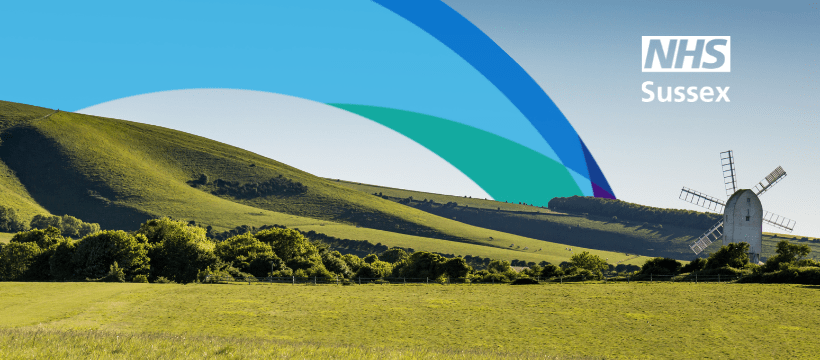Hastings Old Town Surgery has won the top Sussex award for helping people with learning disabilities access their annual health checks.
Hastings Old Town Surgery received a gold award for its work encouraging people with learning disabilities to attend their annual health checks.
Living with a learning disability often leads to a decline in physical and mental health, and an annual health check can help catch any problems early and improve your wellbeing.
Dr Amy Dissanayake, local GP, Deputy Chief Medical Officer for NHS Sussex and National Specialist Adviser to NHS England, said:
People with a learning disability may not realise they are unwell or may find it difficult to tell someone. An annual health check gives them time to talk about any concerns they have about their health and wellbeing and gives them the opportunity to get used to going to the doctor.
Anyone aged 14 or over with a learning disability is entitled to a free annual health check.
Patient Mark talks to Dr Mandy about his check-up at The Brow, our Gold Award winning clinic in Burgess Hill.
The Sussex Thumbs Up Scheme supports GP practices to increase the number of people attending their annual health checks and make reasonable adjustments to support care, reducing health inequalities and preventing premature deaths.
Hastings Old Town Surgery was awarded the highest level of the Quality Kitemark, ‘Gold’, after performing well across a range of criteria, including improving access, training for all staff, providing accessible information, completing health screenings and ‘My Care Passport’ and overall health management.
83.4% of people on Hastings Old Town’s learning disability register had an annual health check last year (although it was offered to 100%).
ACP Sally Tripp, nurse and trainee, clinical lead for learning disabilities at Hastings Old Town Surgery, said: “Hastings Old Town Surgery is a great opportunity for people with learning disabilities to get started.
We are committed to providing the best possible care for all our patients and recognise the health inequalities faced by people with learning disabilities. We understand that accessing primary care can be difficult for people with a learning disability, so we have been working closely with the Health Promotion Team for People with Learning Disabilities to help us tailor our services to meet the needs of people with learning disabilities. This has included running clinics during quieter times on Saturday mornings and carrying out weekly ward rounds in homes for people with learning disabilities.
People aged 14 and over who are on their GP’s learning disability register are entitled to a free annual health check once a year. If you think you have a learning disability, you can ask to be put on this register. The register also helps doctors, nurses and other healthcare staff to know what support you need, such as easier-to-read information, longer consultation times or support in decision-making. These are called reasonable accommodations. People on the learning disability register are entitled to free flu and coronavirus (COVID-19) booster vaccines; if they have a carer, they will also be invited.
Over the past year (April 2023-March 2024), GP practice teams in Sussex carried out 7,865 annual health checks for people with a learning disability, representing 76.2% of people registered as having a learning disability in Sussex (above the national target of 75%).
end
Notes to editors
There are around 1.5 million people with a learning disability in the UK, of which around 1.3 million are in England.[1]
It is well known that people with learning disabilities have poorer physical and mental health than other people and die at a younger age. Many of these deaths are avoidable, not inevitable. Annual health checks are carried out by a doctor or nurse at a registered GP practice. Please let the reception team know in advance when booking if there is anything we can do to make the appointment more comfortable or if you require any reasonable adjustments. This may include a quiet waiting area away from other patients, a longer appointment time, providing information in an easy to understand way (e.g. Easy Read), or other things. Young people with learning disabilities should have annual health checks, even if they are seen regularly by other health and care professionals. Health checks help young people to stay healthy by identifying problems early so they can get the right care sooner. It is also important that as they begin to transition from young people’s services to adult services, they become familiar with these health checks and that they become established as a key part of their health care. NHS Sussex has developed the “Thumbs Up” quality mark award in collaboration with Speak Out to recognise GP practices across Sussex for their proactive efforts towards improving care for people with learning disabilities. We are pleased to start awarding ‘Thumbs Up’ awards to practices from March 2022 and will continue to work with practices to ensure people with learning disabilities receive the care they need, with a particular focus on annual health checks.
[1] Source: Prevalence of learning disabilities from Public Health England (2016) and population data from Office for National Statistics (2020).

